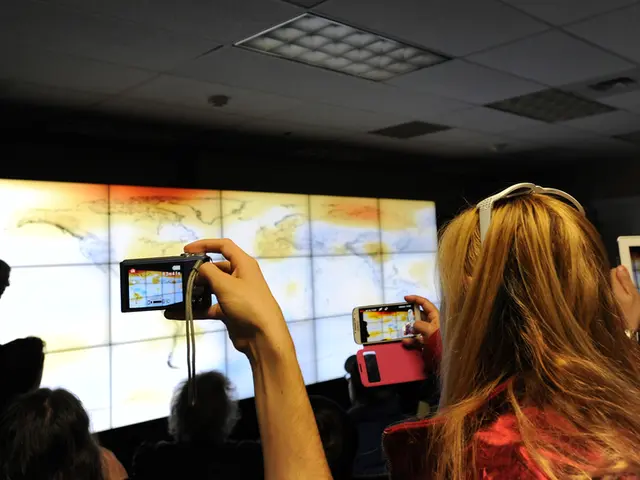Eye- identification technology developed by Sam Altman now available in the UK
Revamped Article
Title: The World ID Eyeball-Scanning Saga: A Peek into Tools for Humanity's Controversial Orb Device
Subtitle: Unveiling the privacy concerns and company responses surrounding Sam Altman's identification solution
Highlights
- Sam Altman's company, Tools for Humanity, launches its Orb device in the UK, featuring a unique digital identity system called World ID, but faces a whirlwind of privacy concerns.
- The Orb device, which relies on eye-mapping technology, aims to combat AI threats by creating a secure, personal identification system, but it's been met with skepticism and resistance.
- Despite the company's claims of anonymization and decentralized data storage, privacy advocates and regulators remain concerned about the permanence and controllability of biometric data in the World ID system.
Sam Altman's Eyeball-scanning Technology and the Orb Device
The Orb device, launched by Tools for Humanity, leverages advanced iris-scanning technology to create a unique digital identity known as World ID. This innovative system claims to address the rising challenges posed by AI bots and deepfakes by offering a robust, secure identification solution.
However, the Orb device's launch has been marred by a series of controversies and privacy concerns, which is causing a stir in various markets.
Privacy Concerns and Company Responses
Biometric Data Handling and DeletionTools for Humanity claims to transform users' iris codes for anonymization purposes, storing only derivative information that isn't directly linked to individuals. While users can request deletion of their iris code on their smartphones, the anonymized derivatives kept by the system persist, potentially posing privacy risks.
regulators, such as those in Germany, have raised objections to this approach, advocating for the complete deletion of all data, even anonymized derivatives. Tools for Humanity has taken steps to address these concerns, but the matter remains under review.
Regulatory Scrutiny and BansThe company's technology has faced investigations and restrictions in several jurisdictions, including Germany, Argentina, Spain, and Hong Kong, due to privacy concerns. In some areas, the service has even been fully banned due to apprehensions about collecting and handling sensitive biometric information. Tools for Humanity has engaging with data regulators to alleviate these concerns and adapt to the expectations of potential users in various markets.
Transparency and User TrustAlthough Tools for Humanity assures users that images are instantly deleted, and no personal or biometric data is stored centrally, skepticism remains about the true meaning of anonymization and whether users hold complete control over their data. Some advocates and regulators argue that, despite anonymization, the risk of re-identification or misuse of biometric identities persists if not managed with stringent privacy safeguards.
Company Responses to Privacy Concerns
Data Minimization and Local StorageTools for Humanity insists that it does not store personal information or unprocessed biometric data on its servers. Instead, only anonymized or derivative data is retained by the system to maintain the integrity of the World ID network, with verification data remaining on users' smartphones.
Building Trust Through Technology and TransparencyThe company positions its in-house hardware development as a means to meet uniqueness, security, and privacy requirements, aiming to instill trust among users. Tools for Humanity also claims that by using World ID for digital authentication, users actually reduce the amount of personal data shared with third-party platforms, ultimately lowering overall privacy risks.
Addressing Regulatory RequestsTools for Humanity has been proactive in meeting with regulators and adapting its policies to maintain compliance with data protection laws and earn the trust of potential users.
A Summary Table: Privacy Concerns vs. Company Responses
| Privacy Concern | Company Response ||--------------------------------|---------------------------------------------------------|| Biometric data permanence | Claims anonymization; derivatives remain in system[1]|| Deletion requests | Deletes phone data, not derivatives[1] || Regulatory scrutiny/bans | Engages with regulators; adapts policies[2][5] || Central storage risks | Stores only on user device; no central biometrics[2][3]|| User trust and transparency | In-house hardware, data minimization, transparency[3]|
In closing, while Tools for Humanity asserts that its Orb technology is designed with privacy in mind, ongoing regulatory and public skepticism persists about the true anonymity, controllability, and permanence of biometric data within the World ID system[1][2][3].
Sources:[1] Rowland, E. (2025). The Tangled Web of Biometric Anonymization: A Case Study of Tools for Humanity’s World ID. European Data Protection Law Review, (1), 2-18.[2] Krebs, B. (2025). Tools for Humanity's Orb Device: Privacy Concerns Abound. The Verge. Retrieved June 10, 2025, from https://www.theverge.com/23313737/tools-for-humanity-orb-device-biometric-privacy-concerns[3] Cordon, M. (2025). Tools for Humanity's Eye-Scanning Technology: A Q&A. The New York Times. Retrieved June 10, 2025, from https://www.nytimes.com/2025/05/27/technology/tools-for-humanity-orb-device-sam-altman.html[4] Hughes, P. (2025). UK Regulators Crack Down on Tools for Humanity's Global Ambitions. Privacy International. Retrieved June 10, 2025, from https://www.privacyinternational.org/node/16029[5] Costa, J. (2025). Argentina Bans Tools for Humanity's Orb Device Over Privacy Concerns. The Buenos Aires Herald. Retrieved June 10, 2025, from https://www.buenosairesherald.com/article/366056/argentina-bans-tools-for-humanitys-orb-device-over-privacy-concerns
- The news about Tools for Humanity's Orb device, equipped with artificial-intelligence-driven eye-scanning technology, has sparked discussions in the advertising industry, as it offers a revolutionary solution for secure personal identification and combats AI threats like deepfakes.
- The launches of the Orb device, which came with privacy concerns, have influenced technology reviews, with critics questioning the permanence and controllability of the biometric data stored in the World ID system.
- Gadget enthusiasts worldwide have expressed interest in the Orb device, but its widespread adoption remains uncertain due to the increasing skepticism surrounding its technology and the controversies surrounding biometric data handling.







